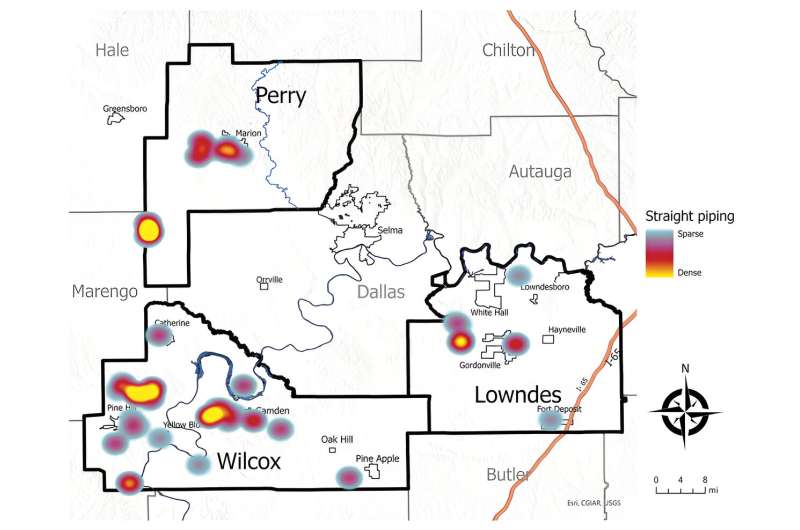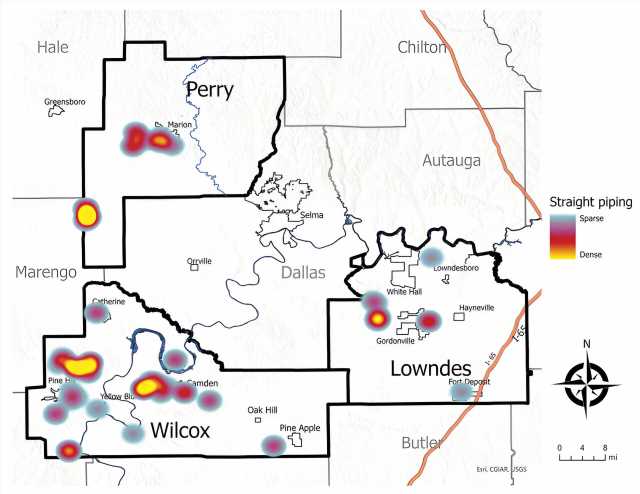
A study published in Emerging Infectious Diseases found no cases of soil-transmitted hookworm in hundreds of tested children, refuting a long thought public health concern that linked the illness to the ongoing sanitation crisis plaguing Alabama’s Black Belt region.
The study tested stool specimens from 704 children from Alabama’s Wilcox and Perry counties for STH. Results surprisingly found no traces of STH in any samples, despite 12% of the study cohort reporting living in homes that directly discharge untreated domestic wastewater.
While survey data did not conclude STH to be a leading cause of illness in the region, the study does suggest that a significant percentage of children in the Black Belt may be exposed to raw sewage, presenting a major public health concern where attention should be refocused.
“The suggestion of hookworm in the Black Belt region of Alabama was the most direct health effect that could be linked to the sanitation crisis in the region,” said Claudette Poole, M.D., assistant professor in UAB’s Division of Pediatric Infectious Diseases and the study’s lead researcher.
“However, we did not find any cases of hookworm or related soil-transmitted infections. This suggests that hookworm should not be the focus of this public health concern. The impact on health in these communities exposed to raw sewage in the environment is more complicated, and other measures to evaluate the overall health of these communities are needed.”
Alabama’s Black Belt region has long been characterized by extreme poverty, poor health outcomes, limited health care access and limited economic opportunities, and notably a large swath of the population has a well-documented lack of effective sanitation and wastewater removal systems. As a result, it has been thought that hookworm, an intestinal parasite of humans, was cause for significant ill health including malnutrition in the region, and inadequate conditions were linked to persistent infection transmissions.
While the study did not find traces of hookworm in stool samples, findings determined that a significant number of children live in homes without functioning septic systems, and that roughly a third of the cohort was positive for other gastrointestinal pathogenic organisms.
For next-step solutions, the UAB Sanitation Health Program has been working to increase education and awareness of this problem in the region, working with relevant stakeholders to identify solutions, build trust with community members and educate providers of the health risks to increase disease surveillance capacity.
“This work would not have been possible without community support,” said Amy Chatham, Ph.D., assistant professor in the UAB School of Public Health Department of Environmental Health Sciences and author of the study. “It was through the daily efforts of our staff, AmeriCorps VISTAs and community partners who call the Black Belt home that we were able to build the necessary trust for widespread participation in the region.”
In addressing next steps for solving the public health crisis in the region, Poole and the research team hope that takeaways include fundamental basic rights for all in the region, including access to safe water and proper sanitation.
“Access to safe water and functioning sanitation cannot be assumed for all households in the United States,” Poole said. “There are many people in this country who are struggling to access this most fundamental of needs. Our current federal and state policies and programs do not have an adequate response to help the most vulnerable communities among us. A comprehensive approach to help these small communities is paramount, as the current system of funding, regulation and operations for rural water and wastewater management is failing.”
More information:
Claudette Poole et al, Cross-Sectional Study of Soil-Transmitted Helminthiases in Black Belt Region of Alabama, USA, Emerging Infectious Diseases (2023). DOI: 10.3201/eid2912.230751
Journal information:
Emerging Infectious Diseases
Source: Read Full Article
